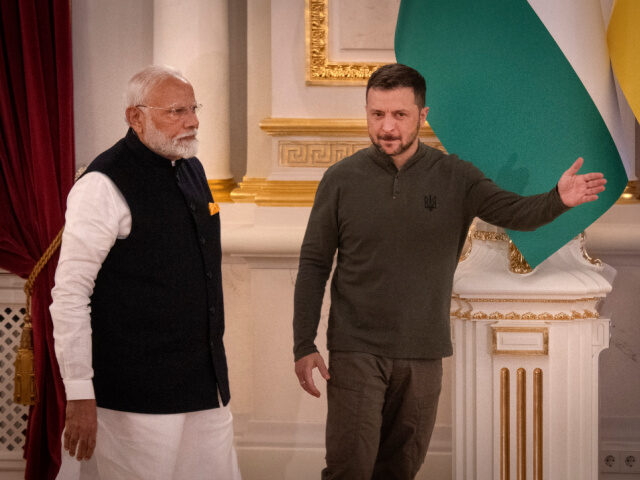Zelensky Pressures India to ‘Block’ Economy of Ally Russia: ‘Put Putin in His Place’
 AP Photo/Efrem Lukatsky
AP Photo/Efrem Lukatsky
Ukrainian leader Volodymyr Zelensky told the Times of India in an interview published on Monday that Prime Minister Narendra Modi could be a powerful actor in ending the Russian invasion of his country, suggesting India should support “blocking” critical aspects of the Russian economy.
“Prime Minister [Narendra] Modi can influence the end of the Ukraine war. This is the huge value of him in any conflict. This is the huge value of India,” Zelensky told Times of India senior assistant editor Rudroneel Ghosh. “There can’t be neutrality between aggressor and victim. It only means you’re with Russia.”
Zelensky, whose relationship with Hindu nationalist Prime Minister Modi has been strained by India’s favorable relations with Russia, suggested New Delhi could host a future edition of a “peace summit” to discuss ending the ongoing war.
Russia first invaded Ukraine in 2014, colonizing the Crimean peninsula and fueling pro-Russian separatist groups in the eastern Donbass region. The conflict dramatically escalated in February 2022 when Russian strongman Vladimir Putin announced a “special operation” to oust Zelensky, accusing him of “Nazi” sympathies. The “special operation” has resulted in Russia colonizing four more regions of Ukraine: Kherson, Zaporizhzhia, and the two Donbass regions of Donetsk and Luhansk.
India has largely abstained from any meaningful advocacy for either side of the Ukraine invasion but has increased its purchases of Russian crude oil – at discounted rates as a result of Western sanctions on Russia – and maintains friendly relations with Moscow through the anti-American BRICS coalition. Modi visited Kyiv in August, after a controversial visit to Moscow, and affirmed a desire to see peace in the region generally, without committing to any action against Russia.
Speaking to the Times of India, Zelensky condemned Modi’s apparent neutrality as support for the invasion and suggested that India could single-handedly turn the tide of the war through economic action.
“Modi is the prime minister of a really huge country and from the perspective of the population and volume of impact, influence, economy, and so on,” Zelensky said, “such a country cannot just say that it is interested in the end of the war, we are all interested in that.”
“Prime Minister Modi can influence the end of the war – this is the huge value of him in any conflict, this is the huge value of India,” Zelensky continued. “1.5 billion of population – which really has influence onto that blocking of Russian [sic] economy, blocking of cheap energy resource, blocking of the defense industrial complex and so on of the Russian Federation will lead to a decrease of the Russian capability to wage war.”
“Put Putin in his place,” he urged. “They [India] can do that not just incentivizing it but vice versa, to slow down all of his desires and you don’t need to say ‘we would like peace,’ you need to act because daily war is killing people”:
Asked if India could potentially mediate talks between Russia and Ukraine, Modi said that he would only accept Indian help in communicating with Russia through his “peace summit” format. Ukraine organized a “peace summit” in June hosted by Switzerland that resulted in no meaningful changes in the war, as Russia did not participate, preventing dialogue.
“We have the platform, this is the peace summit, and I think that we could conduct the second peace summit – it could be conducted in any respected capital city where and we communicated with the prime minister that it could be in Delhi or in any other city,” Zelensky said. “Undoubtedly, it can be in India and the Prime Minister Modi can really do that, he can organize.”
Zelensky emphasized, however, that he would accept such mediation “only according to our format because the war is in our land.”
India and Russia have historically maintained friendly relations, robust trade, and share spots as members of the anti-American BRICS coalition, named for core members Brazil, Russia, India, China, and South Africa. Indian officials have resisted Western calls to sanction Russia over its violence in Ukraine, instead capitalizing on discounts on Russian oil, fertilizers, and other exports to increase trade. India reportedly overtook China as Russia’s biggest crude oil customer in July 2024.
“We have a long-standing relationship with Russia, and this relationship has served our interests well,” Indian External Affairs Minister S. Jaishankar said in October 2022, explaining New Delhi’s resistance to harming ties with Moscow.
“We have, as you know, a substantial inventory of Soviet and Russian-origin weapons, and that inventory actually grew for a variety of reasons – you know, the merits of the weapon systems themselves,” he continued, “but also because for multiple decades, Western countries did not supply weapons to India, and in fact saw a military dictatorship next to us [Pakistan] as the preferred partner.”
Jaishankar has also condemned European leaders for hypocrisy, noting that they remain major consumers of Russian oil and natural gas.
“We still buy a quarter of what Europe buys in one afternoon. So let’s be very clear about what the perspective is,” Jaishankar said in January 2023.
“If it is a matter of principle why didn’t Europe cut on the first day?” he asked. “Why didn’t on 25th February [2022], a complete cut off of energy imports from Russia? You can’t say it’s my principle but by the way, I will do it by my timing.”
Follow Frances Martel on Facebook and Twitter.
Source link

